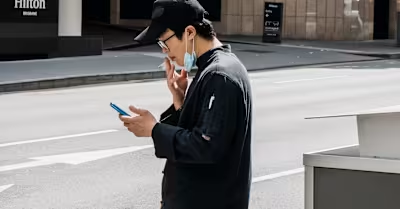How Will Coronavirus Impact College Admissions?

Coronavirus and its resounding impact has been felt around the world and in every aspect of life. Schools have moved to online platforms. Citizens and businesses across the nation are facing economic hardship like never before. But what, specifically does this mean for college students and the admission process? What is the relationship between the coronavirus and college admissions? For those students who have already applied to colleges and are waiting on admission decisions there is a growing anxiety that coronavirus will affect how schools look at applications.
Princeton University attempted to reassure students’ fears in March with a tweet that read: “Please note: The coronavirus outbreak and its effects have no impact on how we evaluate applicants to the University. Every application will receive our full consideration.”
We’re sure you have a slew of questions about the impact of coronavirus and its impact on college admissions, and AdmissionSight is here to answer them all.
Will Coronavirus Change How Colleges Look at Applications?
In previous years, the college admissions process has been quite standard. Colleges rely first on a holistic approach – taking a student’s GPA, test scores, and academic history into account. When an application meets or exceeds the standard benchmark set by the school, an admissions officer will then dive deeper and review a student’s extracurriculars, letters of recommendation, and other deciding factors.
COVID-19 has challenged the traditional model of admissions. GPA’s will be harder to calculate with more high school classes turning to a pass/fail grading system to reflect compromised remote learning systems. Test dates have been pushed back or many schools have made tests optional.
From our view, we believe that the COVID19 situation favors students who are prepared early in the process. Imagine all of the students who didn’t take their SAT’s earlier and are now faced with the situation where they have to wait until potentially the August test date to take their exam.
Other students who wanted to fulfill that extracurricular activity and get it into time into their college applications now are faced with the situation where they must scramble for virtual opportunities in order to make them stand out on paper. Here’s a list of things to watch out for given the COVID19 situation:
Standardized Testing:
Spring Semester Grades: Many students will only be able to present pass/fail grades or other similar marks on their transcripts this spring. This puts students who earned weaker grades the first semester and want to show colleges their improved marks in the 2nd semester of the junior year. Again, this favors students who were earlier prepared in the college admissions process.
Extracurricular Activities: Students are now limited in the activities and are unable to pursue them due to the current coronavirus outbreak and are disadvantaged as a result. At AdmissionSight, we always stress early preparation is key, and we onboard all of our students with a crystal clear roadmap for success the moment they work with us in our program.
The biggest challenge for incoming college students will be how to distinguish themselves and their application. Normally a student’s unique attributes would be showcased through on-campus extracurriculars or involvement in the community. In the wake of our changed society, schools realize that it will be harder to showcase achievements in the traditional sense.
However, the underlying qualities that application readers are looking for – advocacy in the community, a passion for an area of interest, and dedication or leadership – are still as relevant as ever. At AdmissionSight, we’re now advising all of our students including our freshmen and sophomores to pursue virtual opportunities to fulfill their extracurricular activities.
Students can utilize this opportunity as a way to demonstrate their ability to overcome a challenge and get creative. Interested in marketing or media? Snag a remote internship with a mentor. Interested in community advocacy? Volunteer with Red Cross or a coronavirus relief mutual aid group that works to bring supplies to compromised people.
Unable to travel to attend that culinary program in Paris this summer? Learn from home and start a Youtube channel or a blog showcasing your passion for cooking and the projects you’ve worked on. Now is the time to learn a new skill and make your application stand out.
How Will COVID-19 Impact Standardized Testing? Do My Test Scores Still Matter?
In light of the recent financial burdens and limited test dates and prep opportunities available to the high school Class of 2021, more and more schools are going test-optional. But test-optional is not the same as test-blind. Those who have test scores should still submit them for consideration and take the ACT/SAT if possible.
However, this policy decision is unique to each individual school and does not mean that it has become easier to become admitted or apply. Many have become even more selective in choosing students based on other attributes. Students who choose not to submit test scores to a test-optional school should be aware that the other aspects of their application will be weighted more heavily.
For most students the March SAT dates were canceled before they occurred. The April ACT and May SAT were canceled nationwide by the ACT and College Board. The June 6th SAT and June 13th ACT remain as available options as of now, but it is estimated there is a 50 percent chance those dates will also be canceled. While there is hope that these tests are administered as planned, it is currently recommended that students extend their horizons and also consider July and August opportunities. Flexibility on testing location may be required.
The AP testing system has also undergone immense changes this year, with most students forced to switch to remote learning when they were 75 percent of the way through their AP courses. The College Board has adapted and announced that this year’s AP Exams will be 45-minute exams taken from home.
Like many college-level exams, this year’s AP Exams will be open book/open note. Students will be able to take exams on any device they have access to – computer, tablet, or smartphone. They will be able to either type and upload their responses or write responses by hand and submit a photo via their cell phone. Curriculum for the exams will also be adapted to cover only material that was covered in classrooms up until March. Refunds will be offered for those students who paid fees and choose not to take the exams. Students are definitely still encouraged to take the exams, as colleges will still be issuing credit for passing scores.
A Lasting Impact and a Time for Reflection
Ultimately, this time of hardship has taught us that our world has been fundamentally changed, not just in the way we live but in how we perceive our society and adapt to conditions beyond our control.
The spread of COVID-19 throughout the globe is clear evidence that the virus does not discriminate. It doesn’t matter who you are. The disease has infected individuals from all nations, backgrounds, ages, races, genders, and economic status. However, what is clear is that the impact of the virus will certainly be felt differently by people from different socio-economic backgrounds.
The most vulnerable people in our society are likely to suffer more from the health and economic implications of this crisis. As more and more college campuses close and learning goes online, it raises significant concerns about students who depend on college systems such as meal plans, housing, and on-campus jobs to stay secure.
The coronavirus has brought to light flaws in our education system, synonymous with the admissions scandal of last March that begged the question of whether higher education and opportunity really are as inclusive and open to those who come from lower-income families or those with less access to the tools to succeed.
The coronavirus has major implications for the college admissions systems that will extend far beyond the span of the public health crisis and force schools to reform processes in order to level the playing field for all students.
Like this project
Posted Feb 2, 2024
Blog post for AdmissionSight







